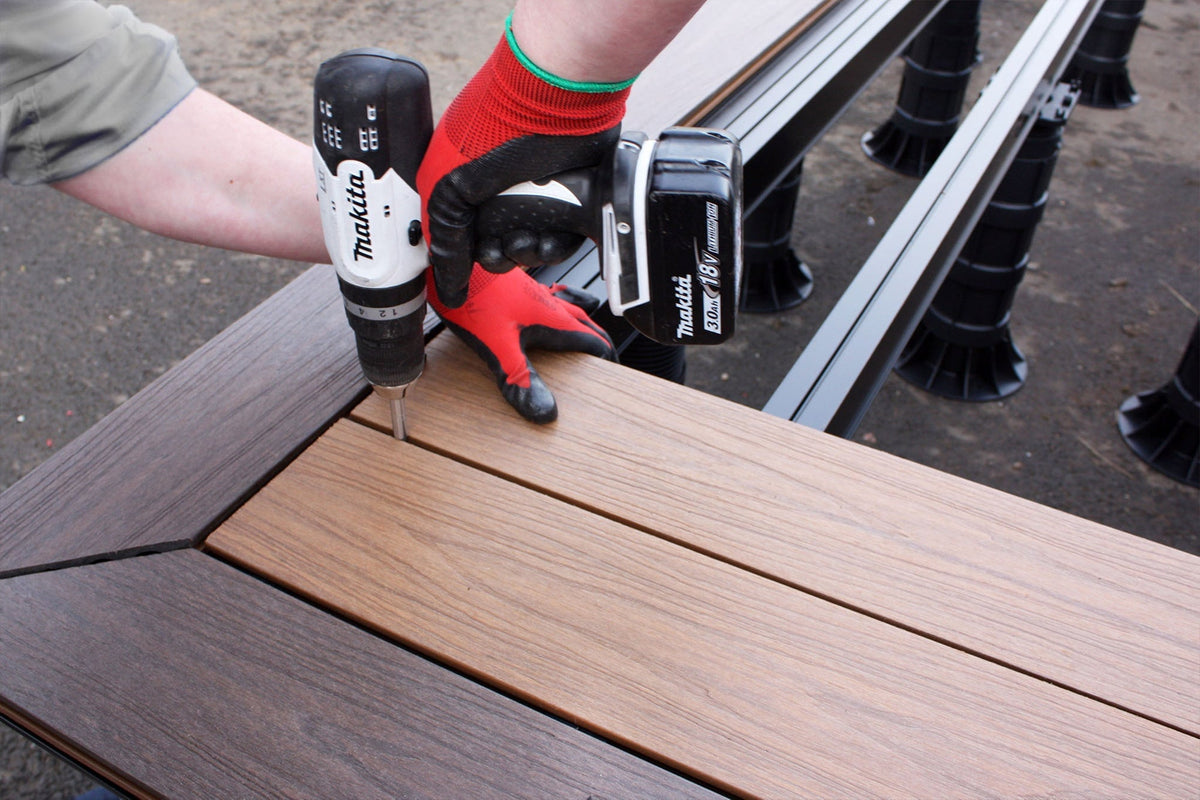Just how to Pick the Right Materials for Your Deck Installation Project
Selecting the appropriate materials for your deck installment project can appear challenging. There are many aspects to think about, from resilience and upkeep to looks and ecological effect. The option in between traditional wood and composite products, each with its very own collection of advantages and disadvantages, can be specifically challenging. The trick is to stabilize your budget plan, design preferences, and way of life requires to produce a deck that will certainly improve your outdoor area for several years to come.
Understanding the Various Sorts Of Deck Materials
When beginning on a deck installment project, the choice of materials comes to be a pivotal decision. Composite materials, on the various other hand, are a mix of timber and plastic, providing sturdiness and resistance to weather components. By recognizing these differences, property owners can make a much more educated choice on the most ideal deck product for their details demands.
Assessing the Durability and Maintenance Demands of Deck Materials
Examining the sturdiness and upkeep needs of deck products is an essential step in deck installment. Toughness includes the material's capability to stand up to extreme weather, deterioration, and its longevity. Cedar and redwood are normally resistant to rot and pests, making them sturdy selections. On the various other hand, pressure-treated timber, while sturdy, may require even more maintenance because of its vulnerability to splitting and deforming.
Comprehending maintenance requirements is equally essential. Some materials require regular sealing or tarnishing to keep their appearance and resist dampness damage, while others, like composite decking, demand less upkeep. By examining these variables, one can choose one of the most ideal decking product, making sure an equilibrium in between resilience, upkeep needs, and visual appeal.
Expense Analysis: Comparing Timber and Composite Decking
Although price may at first appear like an additional concern, it is a substantial variable when contrasting wood and composite decking. Timber, normally a less costly choice, has a lower in advance price. However, in time, maintenance costs can accumulate, potentially making wood a lot more costly in the future. These upkeep expenses may include staining, securing, or replacing harmed boards. On the other hand, composite decking, while costlier initially, calls for less maintenance, potentially minimizing long-lasting expenses. Yet, it's essential to bear in mind that composite decking isn't resistant to deterioration, and substitute expenses can be high. As a result, potential deck owners have to consider their spending plan and willingness to maintain their decks when determining in between timber and composite outdoor decking.
Appearances and Layout Adaptability of Decking Products
While expense is a vital consideration, the visual charm and design adaptability of decking materials also play a considerable duty in the decision-making process. Different products provide varying levels of visual appeal. Natural timber outdoor decking supplies a timeless, timeless look, while composite materials provide a large range of colors and structures to fit diverse tastes and styles. Layout versatility refers to the ability to form and adjust the decking product to meet particular layout requirements. Wood, for example, offers high style adaptability as a result of its ease of cutting and shaping. Compound products, while less versatile in style, are still versatile sufficient for many deck styles. These variables, as a result, are crucial factors in the option of outdoor decking Homepage product.
Ecological Influence of Decking Products
When picking outdoor decking products, one need to think about not only aesthetics and sturdiness, however likewise the environmental effect. It is essential to examine the sustainability of materials and check out recycled decking options. Recognizing the prospective impact on neighborhood ecological communities will certainly guarantee a much more ecologically liable selection.
Assessing Material Sustainability
In the realm of deck building, analyzing product sustainability is an essential action. This includes evaluating the ecological effect of each possible material, considering variables such as the energy needed for its production, its carbon impact, and its end-of-life disposal or recycling alternatives. Timber is a renewable source, yet unsustainable logging methods can lead to logging. Composite outdoor decking products commonly integrate wood and plastic, lowering the need for brand-new wood but enhancing dependence on fossil gas. Aluminum and various other metals might be a lot more long lasting and recyclable, yet their extraction and handling can be energy-intensive. Therefore, the choice of outdoor decking materials must balance capability, aesthetic appeals, price, and sustainability to make sure an accountable and long-lasting installment.
Recycled Decking Alternatives

Compound decking is specifically popular because of its durability and simplicity of maintenance. deck installer austin It's immune to rot, insects, and fading, making it a lasting choice. Recycled plastic decking, on the various other hand, is highly resistant and requires marginal upkeep. While these products might lug a higher first expense, their longevity and minimized environmental effect make them a wise financial investment for the eco-conscious property owner.

Influence On Local Environments
While the benefits of making use of recycled products for decking can not be overemphasized, it's just as important to think about the more comprehensive environmental effects of these choices. The removal, handling, and transport of products can greatly impact regional ecological communities. Logging for timber outdoor decking contributes to habitat loss and climate change. Also the manufacturing of composite products can release unsafe emissions. Conversely, utilizing recycled or sustainably sourced materials can help minimize these impacts. Considering the lifespan of materials can lower environmental effect; longer-lasting alternatives need much less frequent replacement, therefore conserving resources. Appropriate disposal of old decking is vital to decreasing land fill waste. Essentially, an eco-conscious deck job needs careful material selection, lasting sourcing, and liable disposal.
Making Your Last Choice: Tips for Selecting the very best Deck Products
As the short article transitions right into the subtopic of "Making Your Decision: Tips for Choosing the Finest Deck Materials", it is critical to understand the range of deck materials readily available. Striking a balance between durability and appearance is crucial in this choice procedure. The adhering to conversation will guide viewers in making an informed option based on these vital considerations.
Comprehending Different Deck Products
The job of picking the ideal materials for your deck installation can appear intimidating due to the large selection of alternatives readily available. Vinyl or PVC decks are also more sturdy and need less upkeep than composite products, yet they can look less all-natural. Light weight aluminum decks are strong, light-weight, and resistant to rot, but they are likewise the most expensive option.
Sturdiness vs. Aesthetics Balance
Balancing durability with aesthetic appeals can be an obstacle when selecting deck products. The choice often boils down to personal choices and the deck's intended usage. High-traffic areas might require resilient materials like composite decking, which withstands deterioration however may do not have the natural elegance of timber. On the other hand, wood provides a classic charm and warmth that artificial materials struggle to reproduce. It calls for a lot more maintenance and might not last as long. Homeowners need to strike a balance, thinking about both the deck's useful demands and their visual preferences. By doing so, they can ensure their deck remains a functional and appealing exterior space for several years to find.
Verdict
Finally, picking the appropriate products Get the facts for your deck setup project calls for careful factor to consider of aspects such as durability, maintenance, expense, aesthetic appeals, and environmental effect. Whether you go with conventional timber or composite products, your selection needs to straighten with your spending plan, design choices, and way of life. Eventually, the very best decking product is one that boosts your outside space and offers pleasure for several years ahead.